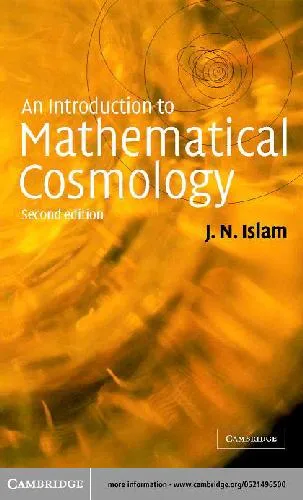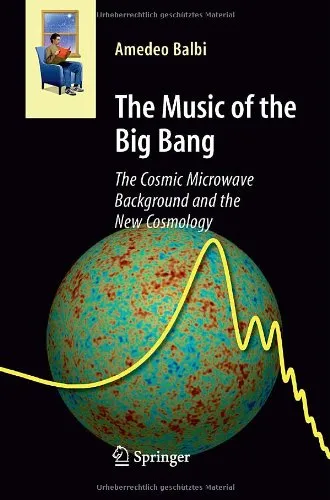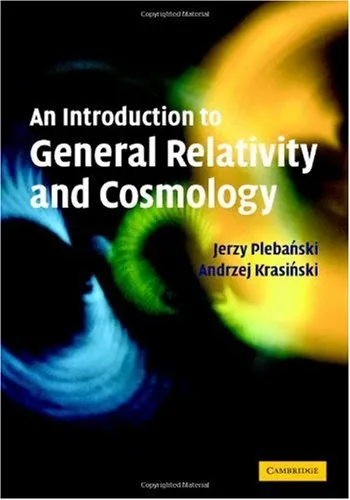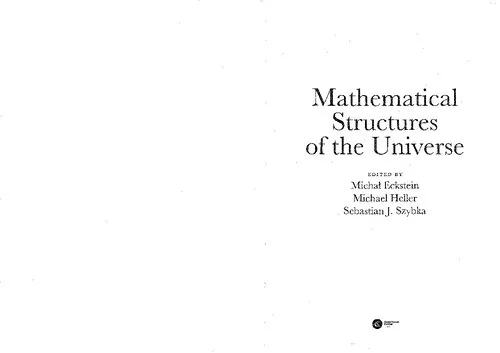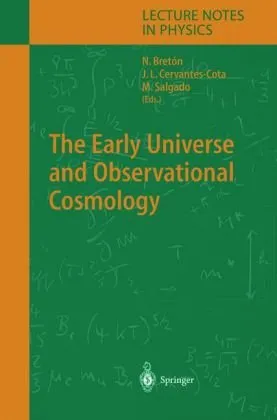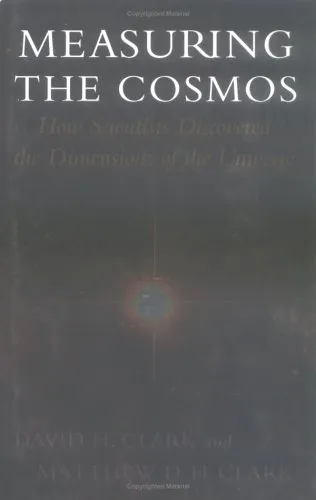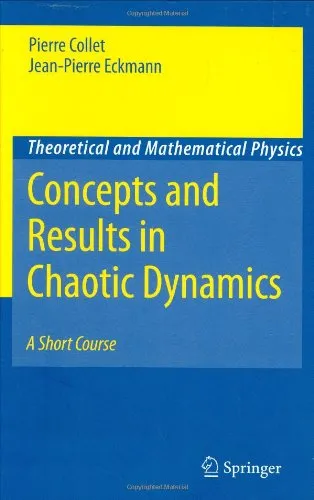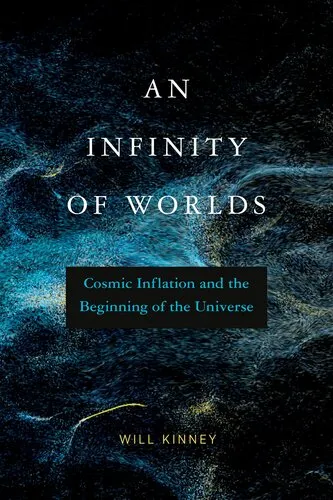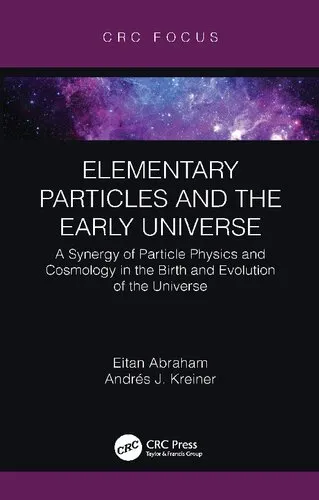An introduction to mathematical cosmology
4.0
بر اساس نظر کاربران

شما میتونید سوالاتتون در باره کتاب رو از هوش مصنوعیش بعد از ورود بپرسید
هر دانلود یا پرسش از هوش مصنوعی 2 امتیاز لازم دارد، برای بدست آوردن امتیاز رایگان، به صفحه ی راهنمای امتیازات سر بزنید و یک سری کار ارزشمند انجام بدینکتاب های مرتبط:
معرفی کتاب "An Introduction to Mathematical Cosmology"
کتاب "An Introduction to Mathematical Cosmology" نوشته اسلام J.N. اثری جامع در علم کیهانشناسی ریاضی است که همواره دانشجویان و پژوهشگران را به عنوان یکی از منابع کلیدی در این زمینه جذب کرده است. این کتاب مفاهیم پیچیده را با دقت بیان کرده و تلاشی است برای ارائه درکی شفاف از کیهان از نگاه ریاضی.
خلاصهای از کتاب
کتاب با بررسی اصول بنیادی کیهانشناسی آغاز میشود و به طور گامبهگام محتوا را از مفاهیم پایه تا موضوعات پیشرفتهتر مانند مدلهای Friedmann، نظریههای Inflation و هندسه کیهانی ارائه میدهد. مولف تلاش میکند تا خواننده را با استفاده از ابزارهای ریاضیاتی مناسب، از پرسشهای کلیدی کیهانشناسی مانند منشأ جهان، ماهیت انبساط کیهانی و ساختارهای بزرگتر از کهکشانها، با اطلاعات کافی آشنا کند.
یکی از ویژگیهای ممتاز این اثر، استفاده از equations همراه با توضیحات شفاف و ساده است که فهم این محاسبات ریاضیاتی را حتی برای مخاطبان غیرمتخصص ممکن میسازد. این کتاب همچنین ارتباط تنگاتنگ نظریات ریاضی با دادههای مشاهدهای در کیهانشناسی مدرن را برجسته میسازد.
نکات کلیدی کتاب
- معرفی مفاهیم کلیدی کیهانشناسی مدرن مانند Big Bang و مدلهای انبساطی.
- ارائه توضیحاتی جامع درباره راهکارهای ریاضیاتی برای حل معادلات کیهانشناسی.
- پوشش مباحث پیشرفته از جمله dark energy و cosmic microwave background.
- اتصال نظریات کیهانشناسی با دادههای علمی قابل مشاهده و تجربی.
- دارای فصولی که به طور خاص به مدلهای Friedmann و نقش نسبیت عام در توضیح جهان اختصاص داده شده است.
نقل قولهای معروف کتاب
"The universe can be understood through mathematical structure and observation, yet its mystery invites endless inquiry."
"Mathematical cosmology bridges the gap between abstraction and reality, offering answers to the biggest scientific questions."
"Our journey through the cosmos is both a quest for knowledge and a reflection on our place in a vast, expanding universe."
چرا این کتاب اهمیت دارد؟
کیهانشناسی امروزی به عنوان یکی از برجستهترین حوزههای پژوهشی در علوم طبیعی، نیازمند رویکردی دقیق و روشمند است. کتاب "An Introduction to Mathematical Cosmology" با ارائه اصول اساسی و پوشش موضوعات پیشرفته، ابزاری بیهمتا برای پژوهشگرانی است که به دنبال درکی عمیقتر از جهان هستند. این کتاب نهتنها درک جامعی از پیشرفتهای اخیر در کیهانشناسی ارائه میدهد، بلکه پلی میان نظریه و مشاهده ایجاد میکند که در هیچ منبع دیگری به این دقت و جامعیت یافت نمیشود. از این رو، این اثر از ارزش علمی و آموزشی بینظیری برخوردار است.
Introduction to "An Introduction to Mathematical Cosmology"
"An Introduction to Mathematical Cosmology" is an insightful and comprehensive exploration of the interplay between mathematical principles and the vast cosmos. Aimed at equipping readers with both a foundational understanding and advanced techniques, the book delves into essential topics, merging theoretical knowledge with practical applications in cosmology. This book stands out because it bridges physics, mathematics, and observational data, bringing these domains together in a cohesive and accessible manner.
Whether you are a student venturing into the field of cosmology for the first time or a seasoned researcher looking for structured clarity, this book offers a clear roadmap. Written in a structured, pedagogical style, it emphasizes the essential mathematical tools and derivations that are pertinent to our understanding of the universe's structures, large-scale dynamics, and enigmatic phenomena like dark matter, dark energy, and the cosmic microwave background (CMB).
Detailed Summary of the Book
The book starts with an accessible introduction to the fundamentals of cosmology, laying the groundwork for more sophisticated mathematical techniques. The early chapters revolve around the standard model of cosmology, explaining concepts such as Hubble’s law, the expansion of the universe, and the Robertson-Walker metric. Throughout its chapters, the book builds upon critical physical and mathematical frameworks, including Einstein’s field equations and the Friedmann-Lemaître equations that describe the dynamics of the cosmos.
One of the highlights of this book is its focus on cosmological models, such as flat, open, and closed universes. The author simplifies these models’ complexities with diagrams, examples, and derivations. Special emphasis is placed on inflationary cosmology and its role in addressing key challenges of the Big Bang model, like the horizon problem and the flatness problem.
Further chapters delve into advanced topics, such as the growth of structure in the universe, the formation of galaxies, and the large-scale distribution of matter. Observational evidence, such as redshift surveys and CMB measurements, is integrated seamlessly with mathematical arguments. The book also touches upon cutting-edge areas of cosmological research, providing readers with glimpses into ongoing debates, including the nature of dark matter, dark energy, and the potential multiverse hypotheses.
Every chapter concludes with exercises (including both straightforward and challenging problems), enabling readers to test their comprehension of the material and think critically about cosmological phenomena.
Key Takeaways
- Understand the mathematical underpinnings of the universe’s large-scale structure and dynamics.
- Explore foundational principles, such as the Big Bang theory, inflation, and cosmic expansion.
- Gain insights into Einstein’s field equations and their role in describing the geometry and fate of the universe.
- Approach complex cosmological topics like dark matter and dark energy through a structured and logical lens.
- Leverage problem sets to strengthen your grasp on mathematical cosmology through practical applications.
Famous Quotes from the Book
“Mathematics does more than merely describe the cosmos—it illuminates its very essence, guiding us through the vast complexities of space and time.”
“The interplay of physics and mathematics is, perhaps, the most eloquent dialogue humanity has ever conducted with the universe.”
Why This Book Matters
Cosmology is one of the most fundamental sciences, as it seeks to answer profound questions about the universe’s genesis, evolution, and ultimate fate. Mathematics, meanwhile, is the universal language that allows us to decode nature’s secrets. "An Introduction to Mathematical Cosmology" unites these disciplines, presenting complex ideas with clarity and purpose.
This book matters because it addresses a critical gap in accessible yet rigorous cosmological literature. For students, it provides the essential tools to succeed in academic and research settings. For educators, it offers a structured, comprehensive curriculum. Researchers and professionals will also find the text highly valuable for its analytical rigor and ability to weave mathematics with empirical observations.
At a time when advancements in technology and telescopes present us with ever more detailed visions of the universe, this book equips its readers with the intellectual tools necessary to make sense of this extraordinary data. Its structured approach, emphasis on mathematical formulations, and integration of contemporary research highlight why it remains a cornerstone text in the field of cosmology.
دانلود رایگان مستقیم
شما میتونید سوالاتتون در باره کتاب رو از هوش مصنوعیش بعد از ورود بپرسید
دسترسی به کتابها از طریق پلتفرمهای قانونی و کتابخانههای عمومی نه تنها از حقوق نویسندگان و ناشران حمایت میکند، بلکه به پایداری فرهنگ کتابخوانی نیز کمک میرساند. پیش از دانلود، لحظهای به بررسی این گزینهها فکر کنید.
این کتاب رو در پلتفرم های دیگه ببینید
WorldCat به شما کمک میکنه تا کتاب ها رو در کتابخانه های سراسر دنیا پیدا کنید
امتیازها، نظرات تخصصی و صحبت ها درباره کتاب را در Goodreads ببینید
کتابهای کمیاب یا دست دوم را در AbeBooks پیدا کنید و بخرید
1551
بازدید4.0
امتیاز0
نظر98%
رضایتنظرات:
4.0
بر اساس 0 نظر کاربران
Questions & Answers
Ask questions about this book or help others by answering
No questions yet. Be the first to ask!
